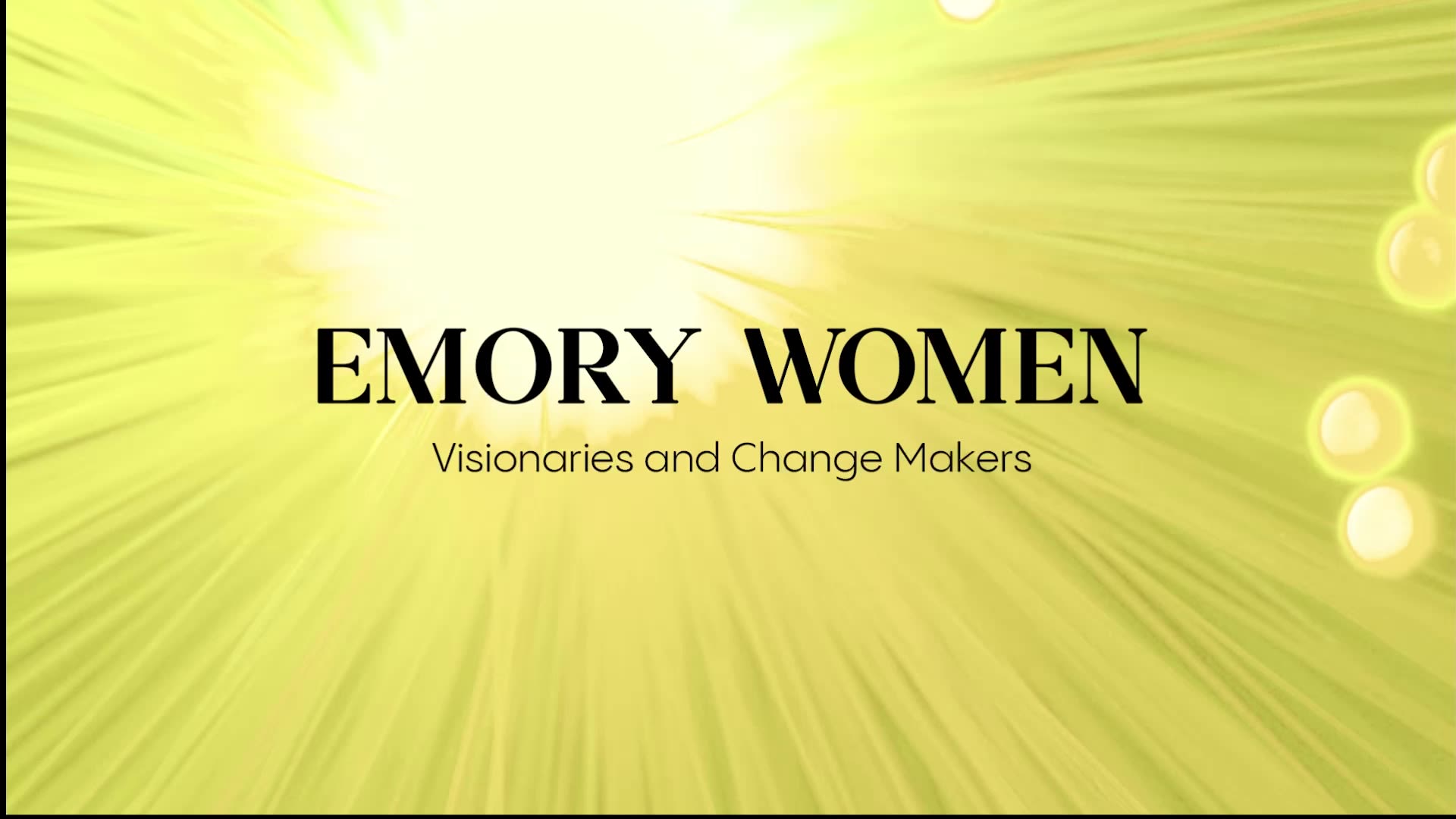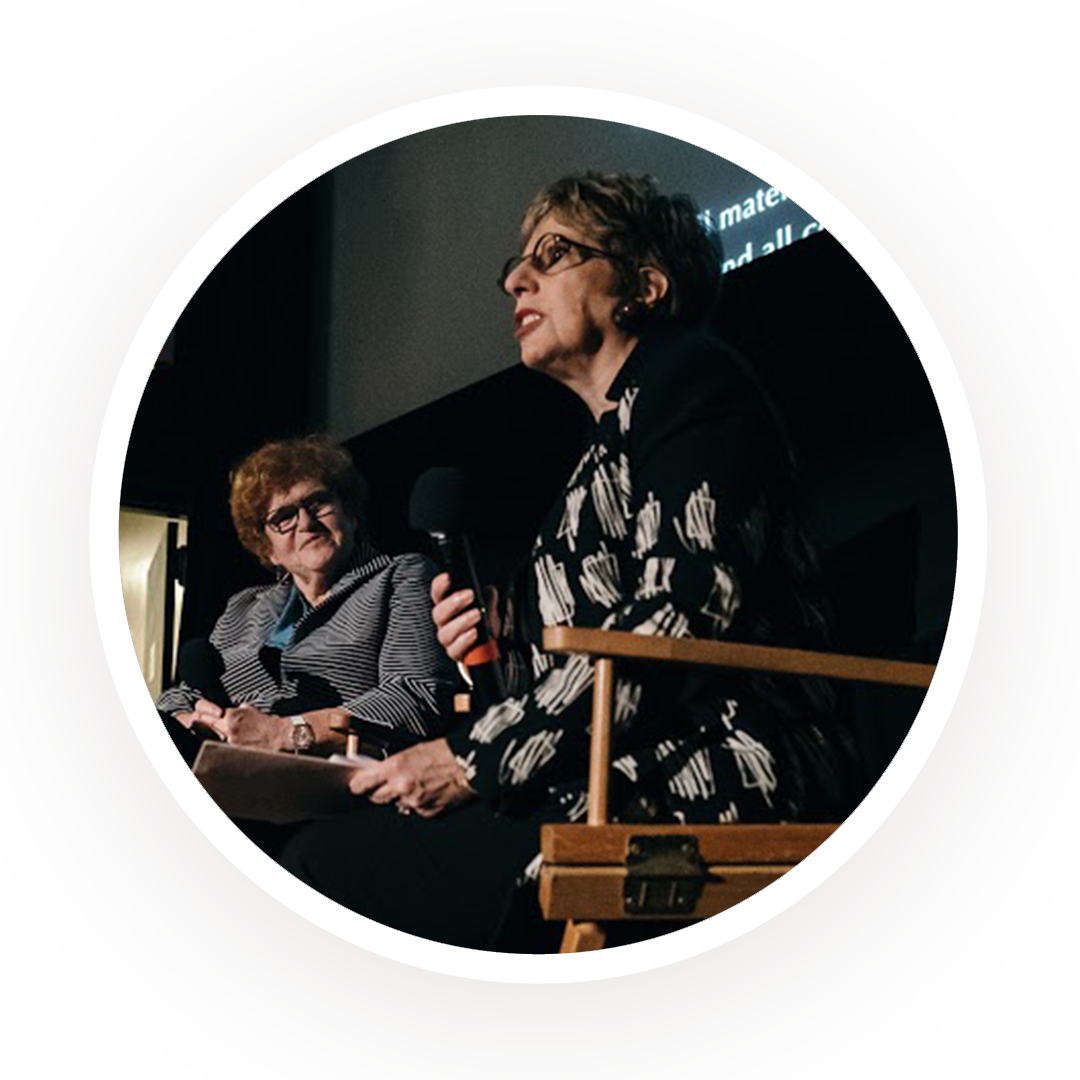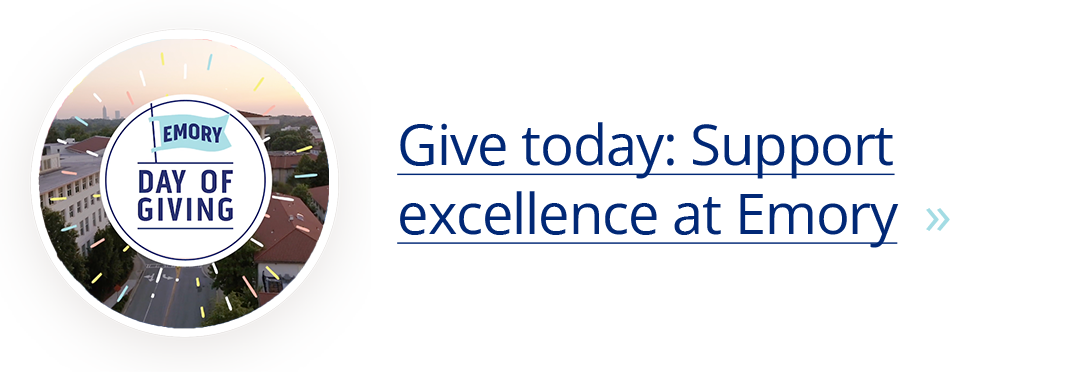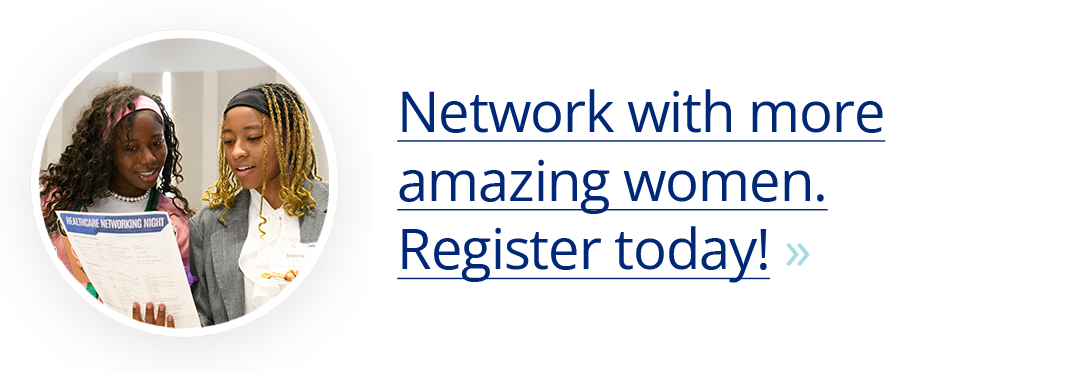
Women of Emory began knocking on the proverbial glass ceiling in the early 1900s, and they continue today. They’ve been the first and only women in many spaces, paving paths so that others may follow. Discover the women of Emory who have made history—or are currently making it—driven by sheer tenacity and visions of a more equitable tomorrow.

Rosalynn Carter
Former First Lady of the United States of America
“I want to use my influence to give voice to those who may be powerless and persuade the powerful to listen.”
While First Lady Rosalynn Carter’s legacy spans the world, she and President Jimmy Carter spent most of their lives in Georgia. In 1982, the couple launched The Carter Center in association with Emory to promote peace and democracy and to address global health issues.
A powerful public advocate for mental health care while she was First Lady, Mrs. Carter partnered for decades with Emory experts to improve access to health care, especially for mental health care, uniting her vision with the university’s strengths in research, training, and service.
She championed women’s rights, speaking out in support of the ratification of the Equal Rights Amendment and founding the Rosalynn Carter Institute for Caregivers that promotes the well-being of family caregivers.
“She loved people. She poured out her love all over the world. It was natural to her to open up her heart to people, not with pity but as partners.”
Rosalynn Carter
Former First Lady of the United States of America
“I want to use my influence to give voice to those who may be powerless and persuade the powerful to listen.”
While First Lady Rosalynn Carter’s legacy spans the world, she and President Jimmy Carter spent most of their lives in Georgia. In 1982, the couple launched The Carter Center in association with Emory to promote peace and democracy and to address global health issues.
A powerful public advocate for mental health care while she was First Lady, Mrs. Carter partnered for decades with Emory experts to improve access to health care, especially for mental health care, uniting her vision with the university’s strengths in research, training, and service.
She championed women’s rights, speaking out in support of the ratification of the Equal Rights Amendment and founding the Rosalynn Carter Institute for Caregivers that promotes the well-being of family caregivers.
“She loved people. She poured out her love all over the world. It was natural to her to open up her heart to people, not with pity but as partners.”


Nanette Wenger, MD
Professor of medicine emeritus, Emory School of Medicine
Nanette Wenger has been a powerful advocate for women’s health and women in health care for nearly 70 years, and an inspiration to countless people whose lives and careers she has touched.
Wenger came to Emory University School of Medicine and Grady Memorial Hospital in 1958. After seeing several female patients with chest pain and uncontrolled hypertension—precursors to heart attack—she began looking for answers. Because the prevailing thought was that heart disease only affected men, there was no existing research in women. So she began to pioneer her own.
It took a while for her to convince others that women’s heart disease needed study. In 1986, Wenger co-chaired the first workshop to explore cardiovascular disease in women, and seven years later she co-authored the first recommendations on recognizing and treating the disease in women. Nearly 30 years later, in 2022, she co-authored recommendations for the prevention of heart disease in women.
Wenger is professor of medicine emeritus at Emory School of Medicine, a consultant for the Emory Heart and Vascular Center, and a founding consultant at the Emory Women’s Heart Center, continuing her influence as a doctor, teacher, and researcher.
“One of the lessons I’ve learned is if I believe what I’m doing is necessary and important, I should persist and endeavor to enroll others in my vision.”
Nanette Wenger, MD
Professor of medicine emeritus, Emory School of Medicine
Nanette Wenger has been a powerful advocate for women’s health and women in health care for nearly 70 years, and an inspiration to countless people whose lives and careers she has touched.
Wenger came to Emory University School of Medicine and Grady Memorial Hospital in 1958. After seeing several female patients with chest pain and uncontrolled hypertension—precursors to heart attack—she began looking for answers. Because the prevailing thought was that heart disease only affected men, there was no existing research in women. So she began to pioneer her own.
It took a while for her to convince others that women’s heart disease needed study. In 1986, Wenger co-chaired the first workshop to explore cardiovascular disease in women, and seven years later she co-authored the first recommendations on recognizing and treating the disease in women. Nearly 30 years later, in 2022, she co-authored recommendations for the prevention of heart disease in women.
Wenger is professor of medicine emeritus at Emory School of Medicine, a consultant for the Emory Heart and Vascular Center, and a founding consultant at the Emory Women’s Heart Center, continuing her influence as a doctor, teacher, and researcher.
“One of the lessons I’ve learned is if I believe what I’m doing is necessary and important, I should persist and endeavor to enroll others in my vision.”


Lee Miller
82L
Lee Miller’s interest in wealth management started when she learned about the Georgia Trust for Historic Preservation’s advisory board. She realized her law degree could be used to help families find ways to create a legacy through planned philanthropy.
Miller combines a high level of empathy with technical expertise as the regional director of the Glenmede Trust Company’s New York metro region. She is not only a leader in an industry where women are underrepresented, but she brings that leadership to serve others as a member of the Trustees Council of the Preservation League of New York State and the Professional Advisory Council of the Metropolitan Museum of Art.
Emory has benefited from Miller’s leadership as well. She’s a member of the Emory Board of Trustees and a leader in the Women of Emory Impact Circle, a collective philanthropic group that funds research to advance the causes of women and girls.
“The Women of Emory Impact Circle is about improving the lives and experiences of women and girls of the Emory community. But it’s also about collaborating with other women to make that happen. It is such an empowering experience to bring all these women together to make decisions that will changes lives.”
Lee Miller
82L
Lee Miller’s interest in wealth management started when she learned about the Georgia Trust for Historic Preservation’s advisory board. She realized her law degree could be used to help families find ways to create a legacy through planned philanthropy.
Miller combines a high level of empathy with technical expertise as the regional director of the Glenmede Trust Company’s New York metro region. She is not only a leader in an industry where women are underrepresented, but she brings that leadership to serve others as a member of the Trustees Council of the Preservation League of New York State and the Professional Advisory Council of the Metropolitan Museum of Art.
Emory has benefited from Miller’s leadership as well. She’s a member of the Emory Board of Trustees and a leader in the Women of Emory Impact Circle, a collective philanthropic group that funds research to advance the causes of women and girls.
“The Women of Emory Impact Circle is about improving the lives and experiences of women and girls of the Emory community. But it’s also about collaborating with other women to make that happen. It is such an empowering experience to bring all these women together to make decisions that will changes lives.”


Claire DePalma
Special advisor to the associate vice president of health, well-being, access, and prevention at Emory University
Claire DePalma never pictured herself working in student affairs. While earning degrees in theater and fine arts, however, she realized she wanted to use her love of learning in a different way: to help students effect change.
The realization led DePalma to earn a doctoral degree in education in student affairs. She received the 2023 Dissertation of the Year Award from the Southern Association for College Student Affairs for her research, which explored strategies for white student affairs professionals to be leaders in antiracist practices. These are the practices she brings to her role as an advisor to Emory Campus Life.
“I believe antiracist practices are necessary to create a more liberatory higher education, one that empowers community members of all identities to feel they belong. My mission as a student affairs professional is to create conditions in which all students can thrive.”
Claire DePalma
Special advisor to the associate vice president of health, well-being, access, and prevention at Emory University
Claire DePalma never pictured herself working in student affairs. While earning degrees in theater and fine arts, however, she realized she wanted to use her love of learning in a different way: to help students effect change.
The realization led DePalma to earn a doctoral degree in education in student affairs. She received the 2023 Dissertation of the Year Award from the Southern Association for College Student Affairs for her research, which explored strategies for white student affairs professionals to be leaders in antiracist practices. These are the practices she brings to her role as an advisor to Emory Campus Life.
“I believe antiracist practices are necessary to create a more liberatory higher education, one that empowers community members of all identities to feel they belong. My mission as a student affairs professional is to create conditions in which all students can thrive.”


Leah Ward Sears
80L
In the early 1960s, a young Leah Ward Sears moved from her birthplace of Heidelberg, Germany, to the United States and first experienced racism—a harsh reality that continues to plague her heart and mind. This awareness ignited her lifelong commitment to activism, advocating against racism and gender discrimination to create opportunities for herself and others.
Sears created safe places for women at work and in their homes, founding and serving as the first president of the Georgia Association of Black Women Attorneys and founding the Battered Women’s Project in Columbus, Georgia. In 2001, she received the Emory Medal for her leadership and service to local, national, and global communities
Her activism cemented her place in Georgia history. In 1992, Sears became the youngest and first woman appointed as a superior court judge in Fulton County and later to the Supreme Court of Georgia. She eventually became the first African American woman in the United States to serve as chief justice of a state supreme court.
Sears now serves on Emory’s Board of Trustees and as a partner at the Smith, Gambrell & Russell, LLP law firm in Atlanta, Georgia.
“My father used to say to my mother that his fear was that I’d spend my entire life trying to break a glass ceiling that could never break. I did spend years busting my head against that ceiling and it got bloodied, but that ceiling did break.”
Leah Ward Sears
80L
In the early 1960s, a young Leah Ward Sears moved from her birthplace of Heidelberg, Germany, to the United States and first experienced racism—a harsh reality that continues to plague her heart and mind. This awareness ignited her lifelong commitment to activism, advocating against racism and gender discrimination to create opportunities for herself and others.
Sears created safe places for women at work and in their homes, founding and serving as the first president of the Georgia Association of Black Women Attorneys and founding the Battered Women’s Project in Columbus, Georgia. In 2001, she received the Emory Medal for her leadership and service to local, national, and global communities
Her activism cemented her place in Georgia history. In 1992, Sears became the youngest and first woman appointed as a superior court judge in Fulton County and later to the Supreme Court of Georgia. She eventually became the first African American woman in the United States to serve as chief justice of a state supreme court.
Sears now serves on Emory’s Board of Trustees and as a partner at the Smith, Gambrell & Russell, LLP law firm in Atlanta, Georgia.
“My father used to say to my mother that his fear was that I’d spend my entire life trying to break a glass ceiling that could never break. I did spend years busting my head against that ceiling and it got bloodied, but that ceiling did break.”


Eva Rothenberg
19Ox 21C
In her first year at Oxford College, Eva Rothenberg discovered the relationship between world views and language, awakening her love of linguistics. That spring, she presented her own original research in Wales at the International Corpus Linguistics Conference.
At Emory College, she co-hosted a radio show on WMRE and tutored at the Emory Writing Center. When her semester abroad in Prague was cut short by COVID-19, she completed college remotely while interning at Georgia Public Broadcasting and CNN, eventually working for CNN after graduation.
Rothenberg graduated in 2021 with highest honors from Emory College of Arts and Sciences, earning joint degrees in English and linguistics. She is among 51 Americans selected in 2024 for the Marshall Scholarship, becoming Emory’s 19th Marshall Scholar.
Rothenberg is studying applied linguistics at the University of Birmingham in the United Kingdom. The university is a pioneer in corpus linguistics, the computer-based methodology that examines language qualitatively and quantitatively.
Her experiences and opportunities at Oxford and Emory sparked her desire to research and weave together digital humanities and public scholarship.
“I see journalism and academia as complementary tools for public education. I want to engage in conversations about structural problems and societal issues from different perspectives.”
Eva Rothenberg
19Ox 21C
In her first year at Oxford College, Eva Rothenberg discovered the relationship between world views and language, awakening her love of linguistics. That spring, she presented her own original research in Wales at the International Corpus Linguistics Conference.
At Emory College, she co-hosted a radio show on WMRE and tutored at the Emory Writing Center. When her semester abroad in Prague was cut short by COVID-19, she completed college remotely while interning at Georgia Public Broadcasting and CNN, eventually working for CNN after graduation.
Rothenberg graduated in 2021 with highest honors from Emory College of Arts and Sciences, earning joint degrees in English and linguistics. She is among 51 Americans selected in 2024 for the Marshall Scholarship, becoming Emory’s 19th Marshall Scholar.
Rothenberg is studying applied linguistics at the University of Birmingham in the United Kingdom. The university is a pioneer in corpus linguistics, the computer-based methodology that examines language qualitatively and quantitatively.
Her experiences and opportunities at Oxford and Emory sparked her desire to research and weave together digital humanities and public scholarship.
“I see journalism and academia as complementary tools for public education,” she says. “I want to engage in conversations about structural problems and societal issues from different perspectives.”









